
How Kroger-Albertsons merger could affect Washington shoppers
(The Center Square) – Last year, Kroger and Albertsons announced a planned merger between the two companies to the tune of $24.6 billion. As part of that deal, Kroger announced in September it will sell 104 Washington-based stores (413 nationally) to C&S Wholesale Grocers to help avoid possible claims of creating a monopoly in some regions.
Aside from the store sales, one stakeholder involved in the process says Washington shoppers should expect to see better prices on the grocery aisle as a result of the merger, without involving store closures or front line job cuts.
Scott Moses is the head Of Grocery, Pharmacy & Restaurants for Solomon Partners, a financial advisory firm, and advised Albertsons on its pending merger with Kroger.

During a Wednesday media conference, he stressed that the merger is a necessary step for grocery supermarkets to compete in a rapidly changing market.
“The transaction is designed to make sure they remain viable,” he said.
Moses notes that the market involves two separate types of businesses, grocery supermarkets and grocery supercenters. According to sales data provided by Moses, Walmart has dominated over the past 20 years in terms of grocery sales. In 2003, 10 of the top 15 in terms of sales were supermarkets like Kroger, Albertsons and Safeway.
Now, supercenters like Costco and Amazon rank in the top 10. Though Kroger remains second in terms of grocery sales, the difference between its sales and Walmart's has gone from $25 billion in 2003 to $205 billion. National and discount grocers, including Dollar General and Trader Joe’s, now generate 67% more grocery sales than supermarkets, and have gone from 21% of the market in 2003 to 62% as of this year.
That change has been the result of a variety of factors, such as the rise of online grocery shopping, which has quadrupled in sales between 2018-2022. Additionally, national discount stores have also expanded their grocery operations and opened 23,000 new stores in the country since 2003.
It’s a situation that Moses says represents an “existential threat” to supermarkets like Kroger and Albertsons, which have experienced a lower profit margins over the years to keep prices competitive.
However, Moses says another competitive advantage supercenters have are their network of fulfillment centers or warehouses, where products are packaged and shipped after being purchased online. Washington state has two Walmart fulfillment centers, while Amazon has 13.
Moses said that “no supermarket can remotely do what those companies have done” in terms of investing in fulfillment centers and technology.
“As a consequence, the competitive dynamics have become incredibly difficult,” he added. “This transaction is designed to enable Kroger and Albertsons to better compete with these changing dynamics.”
Also speaking in favor of the merger is Chris Cargill, executive director of the the Mountain States Policy Center. In a recent article he wrote that “more Americans are doing their shopping online or at a discount warehouse. Fewer go inside the grocery store. For many, that weekly trip to the market is becoming a thing of the past.”
He added, “As with any proposal, there is fear of the unknown. But we shouldn't let fear destroy an opportunity to increase competition and improve the outlook for the consumer.”
World-Famous Companies That Started in Washington
Gallery Credit: Pete Christensen


